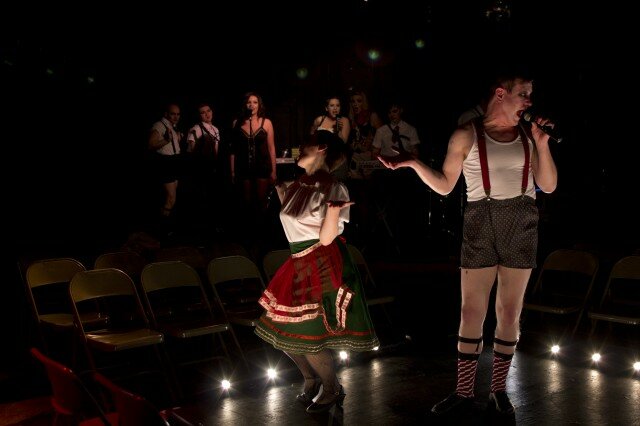Schoolyard’s Scrappy Cabaret Takes a Risk at Re-Bar

The Schoolyard's Cabaret (Photo: David Wulzen)
In Cabaret’s most recent appearance on Broadway the production’s lengthy run revived some of the glam from the days when its theatre was known as Studio 54. It was a very posh affair, very slick, very Broadway (even in its stripped-down appearance at the Tony Awards).
While the Broadway revival was easy on the eyes and ears, all the slickness was a little out of place for Weimar Berlin. The Schoolyard’s current production at Re-Bar (through May 12; tickets) overcomes that lack of historical continuity in a production born out of its environment. It’s a haute cuisine recipe, but with local, organic ingredients. It doesn’t always succeed in its risk-taking but let’s be grateful and enthusiastic for its willingness to try.

The Schoolyard's Cabaret (Photo: David Wulzen)
Schoolyard’s ensemble of beautiful performers do great work on all counts. Todd Hull and Monica Wulzen are standouts in the acting department, Hull as Herr Schultz, a mild-mannered Jewish grocer; and Wulzen as the club singer Sally Bowles.
Daniel Wood, as Ernst Ludwig, finds a bit of color in a role with a tenuous grip on its third dimension, but his grip on his accent is less sure. Gary Zinter’s Emcee was plagued with mic problems in an immensely challenging sound engineering environment. When his voice came through, however, the resonant, rasping baritone captivated.
This production’s biggest risk in its attempt to bring John Kander’s score into a KEXP world.
The score has been re-jiggered for a krautrock-inspired band in Kraftwerk uniforms and featuring a pair of synthesizers, a piano keyboard, drum kit, and guitar. It’s an uneasy mashup. Taking Kander’s Broadway interpolation of Weimar-era Kurt Weill and interpolating it far further afield results in diffusion and dissonance. When it works, as in most of the Emcee’s numbers and the early nightclub number “Don’t Tell Mama,” it clicks without inspiring.
Zinter’s achievement is that he dispenses with charm and smarm of most Emcees in favor of the disconnection (with a nod to Brecht) of an alt-pop star whose lips never appear from behind the microphone. The proof of the pudding is that Wulzen is less successful when she goes full-bore Patti Lupone in her final number.
Kander and Ebb created cool, affectless songs that serve as an antidote to the Broadway contrivances of overblown emotion. Ebb’s soft shoe lyrics and Kander’s breathless vamps balance musical theatre’s melodrama. Power chords give this production an unseemly touch of Andrew Lloyd Webber without the lyricism required of the old-fashioned romance at Cabaret’s center.
The roughness of the musical direction is also reflected in the costuming and some of the performances but these feel right at home here. Schoolyard is a scrappy theatre doing a story of battered people scraping along in a battered space still dedicated to making magic. Fraulein Schneider’s reference to economic hardship states the obvious. This production is on time and in the right venue. In the face of financial straits and rising xenophobic fascism we’d do well to revisit the Cabaret.
- Share this:
-
-
- Share
- Digg
- StumbleUpon
![]() is an online magazine of news & culture. A conversation about the things on Seattle's mind.
is an online magazine of news & culture. A conversation about the things on Seattle's mind.
- More about us.
- Got a tip for us? Send an email to .
- If you'd like to contribute regularly, .
- Follow us on Twitter @thesunbreak.
- Like us on Facebook.
Dear Constant Readers:
You can subscribe to The SunBreak for just $1 per month, and help keep the news & culture coming. Just $12 for a whole year!
Thank you!
Your SunBreak Delivery Options
-
 Subscribe via RSS
Subscribe via RSS -
 Daily Email Digest of The SunBreak
Daily Email Digest of The SunBreak
